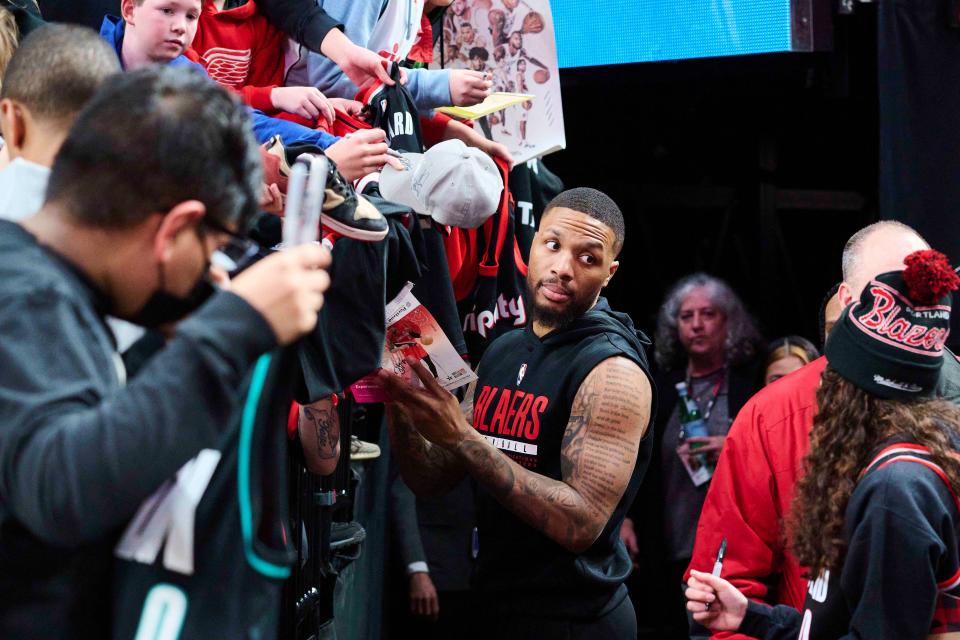Damian Lillard wants out of Portland. Do the Trail Blazers owe him that?
Damian Lillard’s trade request to get out of Portland is the kind of drama that is sustenance for the NBA’s news cycle.
It brings up a fascinating question: What do the Trail Blazers owe Lillard, who wants a trade to the Miami Heat?
In basic terms, they owe it to themselves to get the best deal possible, one that improves their present and future regardless of where Lillard wants to play. The franchise’s main obligation is to itself.
That’s also a myopic and perhaps short-sighted view, too, if that’s Portland's only approach to a Lillard trade. There are layers to this, both in general and specific to Lillard. There is a big-picture view that impacts the Blazers and how they want to be perceived by players, agents and other teams. That is important.
From the NBA’s perspective, commissioner Adam Silver does not like trade requests becoming public. He prefers both sides honor the terms of the agreement, and if trade requests are made, he wants them kept private and worked out behind the scenes.
Lillard’s trade request isn’t a surprise. He has spent 11 seasons with the Blazers but hasn’t made the playoffs the past two seasons. Of the eight playoff appearances the Blazers made during Lillard’s career, they reached the Western Conference Finals once, lost in the first round five times and lost in the second round twice.

These last two seasons under .500 and the Blazers’ inability to improve the roster and become a contender prompted Lillard’s decision. Turning 33 on July 15, Lillard still has productive years remaining. Last season, he averaged career-highs in points per game (32.2) and 3-pointers made per game (4.2) and matched his career-high shooting percentage (46.3%).
He is exactly what Miami needs to help Jimmy Butler and Bam Adebayo.
Portland and GM Joe Cronin don’t have to send Lillard to the Heat. The Trail Blazers have been good to Lillard. He has earned $235.5 million from the Blazers and will be paid $216.2 million over the next four seasons, including $63.2 million in 2026-27.
It’s been a great relationship, and Lillard has benefited. But a successful relationship works two ways.
The Blazers have prospered from Lillard. Their stretch during his time is only matched by the 1980s/1990s/early 2000s teams featuring Clyde Drexler, Terry Porter, Rasheed Wallace, Steve Smith and Arvydas Sabonis. Lillard has put fans in seats, boosted sales of team merchandise and helped the business side sell advertising. He had a part in increasing the value of the franchise.
While technically the Blazers don’t owe him anything other than what the contract stipulates, it’s not that simple in the NBA. The Blazers and Cronin have reputations at stake, and it makes sense to maintain a strong relationship with one of the greatest players in franchise history, a person who can someday be a great ambassador for the team when his playing career is over.
While Lillard doesn't have the same leverage as Bradley Beal, who had a no-trade clause in his contract, he has some. Why would a team give up valuable draft picks and players for a player who doesn't want to be there? That team could be in the same position as Portland one year from now.
There is a lasting impact in how a team treats a franchise player, and no team wants to have a negative perception from players, agents and fans. Look no further than Vince Carter and the Toronto Raptors. It took years for the fractured relationship to begin healing. It’s a business, but not one without real emotions.
Another important angle exists: Lillard has been told repeatedly by management the plan is to build a contender around him − so much so that Lillard was convinced to sit the final 10 games of the season (the Blazers went 1-9) so Portland had a better chance at a better draft pick.
Lillard waited and waited and was under the impression the Blazers would move the No. 3 pick and complete other moves to make that happen. He’s still waiting, and it appears the Blazers want a youth movement. In a case of getting the best of both worlds, they want a youth movement with Lillard, even though that’s not what they indicated.
The Blazers might be inclined to get the best package for Lillard regardless of what he wants. That’s within their right. But is that how they want this to end? They can’t trade him for nothing. But they can work − and should work? − to get him where he wants to go.
There is a way to salvage this that is satisfactory to both sides.
There's such a thing as a graceful breakup.
This article originally appeared on USA TODAY: Damian Lillard wants out of Portland. Do Trail Blazers owe him that?

